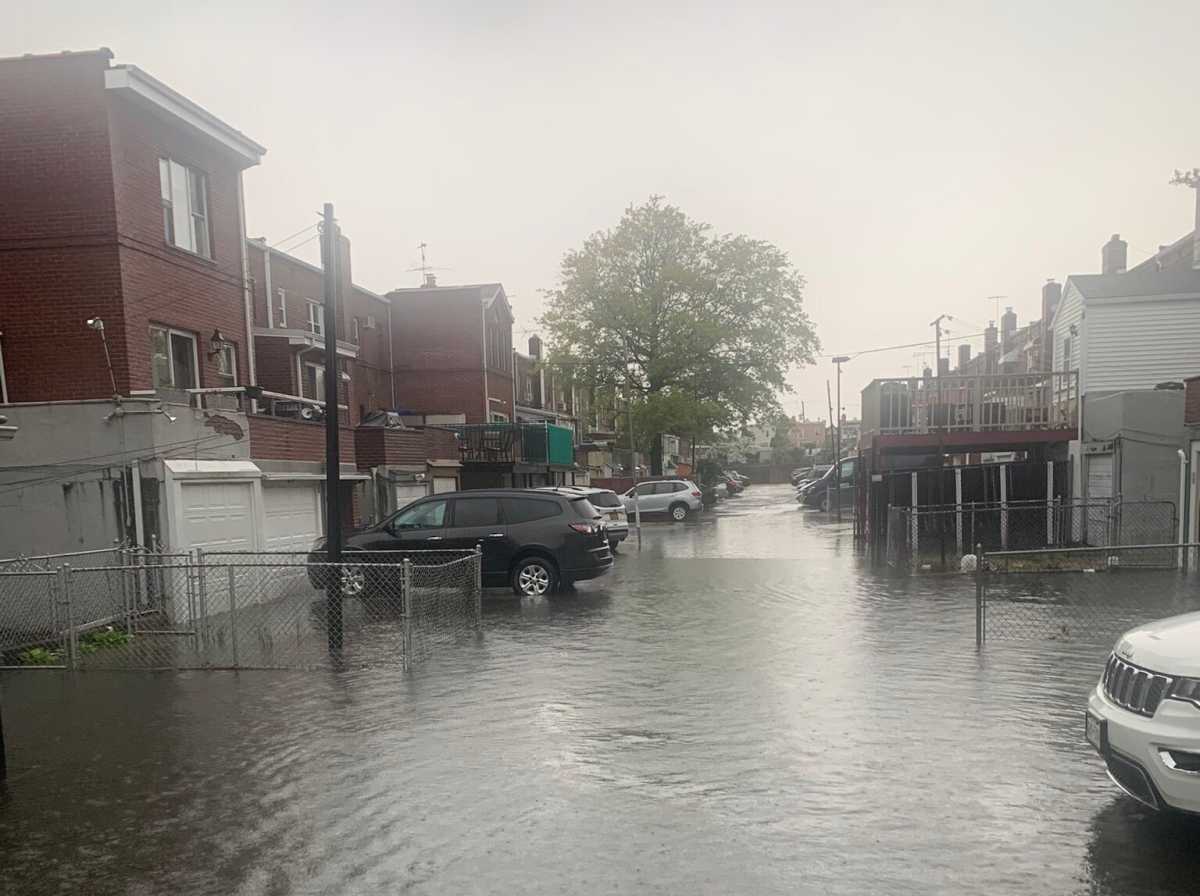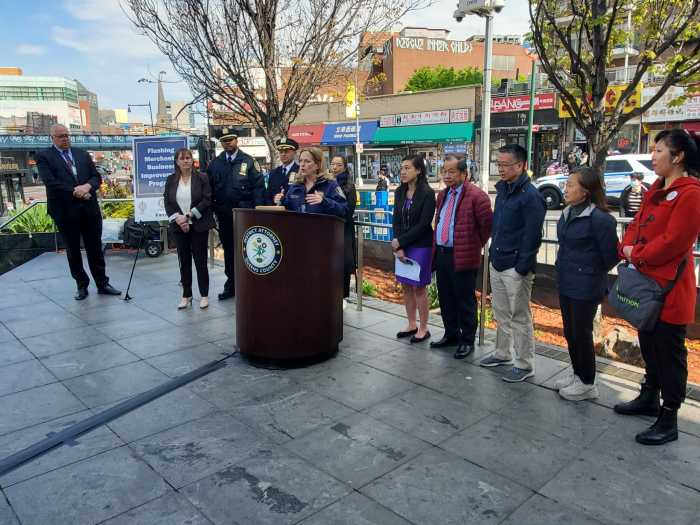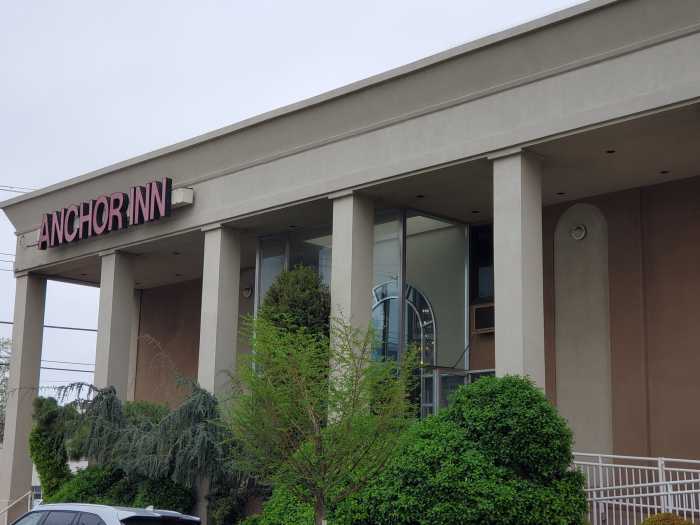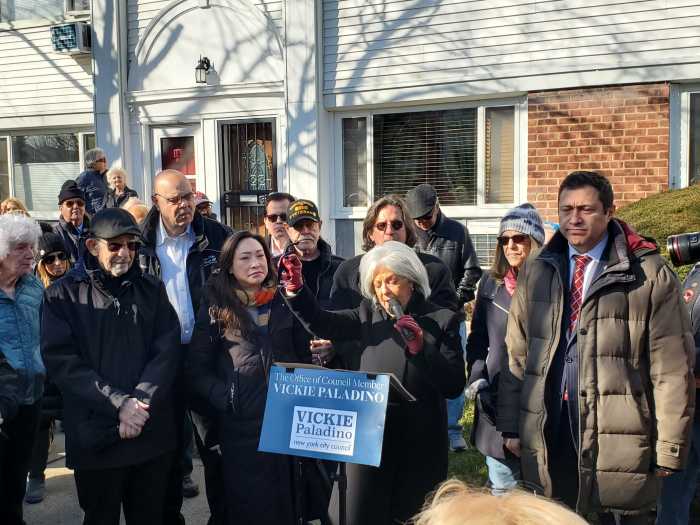Sunday’s heavy rainstorm resulted in the flooding of many streets, major highways and homes across Queens, and now, residents are seeking help to repair what has been damaged.
Video by Mala Balram
Many residents experienced flooding in the basements of their homes after the rainstorm on April 30. Elected officials, including Council Members Sandra Ung and Vickie Paladino, urged residents whose homes suffered flood damage to contact their offices.
“The past weekend’s heavy rainfall, unfortunately, caused more flooding for residents in the neighborhoods around Kissena Park, an occurrence that is becoming increasingly common,” Ung said. “My office was contacted by numerous constituents in the area, and I share their frustration. I am committed to working with my colleagues at all levels of government to find real solutions so that residents don’t have to be worried about property loss, or worse, whenever the forecast calls for rain.”
Severe flooding is impacting areas of district, including the area around 153rd St and Peck Ave.
If you're in immediate danger, call 911. Report damage to my office by emailing District20@council.nyc.gov. pic.twitter.com/YpsbFabF2N
— Sandra Ung 黄敏仪 (@CMSandraUng) May 1, 2023
For those unlucky enough to have been driving Sunday evening, many had to navigate through flooded streets and take alternate routes to reach their destinations. For example, all northbound lanes on the Cross Island Parkway ended up getting shut down at Totten Road due to flooding. The Brooklyn-Queens Expressway also got shut down in both directions at Queens Boulevard.
The storm’s damage wasn’t just limited to flooding of streets and homes. A large tree ended up toppling over on Hillside Avenue in Queens Village. The fallen tree ended up blocking traffic on the road.
Yikes! As the sun comes up in Queens, @JohnBDias is getting a clearer look at a tree that came down during the storm. https://t.co/26Z7ywyCaR pic.twitter.com/xfSewdoyof
— CBS New York (@CBSNewYork) May 1, 2023
This recent flooding comes just days after the first stages of a project meant to upgrade the sewer infrastructure and water mains in Maspeth were completed. The result of this project is meant to reduce the amount of flooding experienced by the area from storms like the one that hit the city Sunday.
“Too many of our neighbors have lost their property, homes and even their lives to severe flooding,” Congresswoman Grace Meng tweeted Sunday. “I’m glad that our city has made these infrastructure improvements a priority and I’ll continue fighting to secure funding to combat flooding in Queens.”
The city is also working on expanding its Cloudburst program to Corona and Kissena Park, Queens, as part of an ongoing effort to better prepare for intense rain events. Supported by nearly $400 million in capital funds, these specially designed, built, and engineered infrastructure projects will protect residents and property.
According to the announcement made earlier this year, the city’s Department of Environmental Protection plans to install infrastructure that will absorb, store, and transfer stormwater to prevent flooding during extreme rainfall in a short period.
As I've said numerous times, the city and state must use funding from the federal infrastructure bill to help mitigate the problem. 2/2
— Grace Meng (@RepGraceMeng) May 1, 2023
Meng stressed the importance of the city taking action to upgrade more of the water mains and sewer infrastructure across the city to better prepare for severe storms that may strike in the future.
“It is unacceptable that residents continue to endure this problem,” Meng said. “While we did not see the extensive damage that our borough sustained from Hurricane Ida, it’s just a matter of time until we face such devastation again, especially as we deal with the impacts of climate change. As I’ve previously said, Queens residents cannot continue rebuilding from one disaster to the next only to wonder how much rain may fall. We need swift action to help save lives and prevent future damage.”
Meng pointed out that after she helped pass the federal infrastructure bill into law in 2021, New York State received billions of dollars. Since then, she has constantly called upon the city and state to direct a portion of this funding toward combating the flooding experienced by communities across New York City. Today, In particular, she has called for upgrading the city’s sewers and catch basins.
Paladino said she spent much of Sunday communicating with the New York City Department of Environmental Protection (DEP) as they deployed resources at sites across the city. Paladino encouraged residents within her district who experienced flooding to call 311 before contacting her office by phone at 718-619-8611 or via email at District19@council.nyc.gov.
“For the last year, my office has been engaged with DEP and DSNY to clean storm drains, sewers and perform frequent camera inspections and I can report that we’ve made significant progress in mitigating residential flooding, which had become very common,” Paladino tweeted. “In fact this is the first flooding incident since we began our initiative last year. However, the fact remains that without major capital improvements to our infrastructure, this will continue to be a challenge, especially along the Cross Island Parkway.”
According to a spokesperson for DEP, the effects of climate change have made the older sewer system outdated when handling more intense rainfall like that of Sunday’s storm. Other forms of drainage are needed to prevent flooding like this, which continues to occur.
“The sewer system is roughly 7,500 miles long, and it was not designed for the type of storms that climate change is bringing to the area,” the DEP spokesperson said. “Some areas of the city received more than six inches of rain over the weekend. And, in many cases, the sewers cannot be built any larger than they already are – there simply is no more room under the roadways to make them larger.”
New York City currently has been investing heavily in other forms of drainage. This includes over 11,000 curbside rain garden installations created over the last several years, with thousands more being built in the coming years. Additionally, DEP has directed developers that any new developments or redevelopments must retain stormwater on site – and not allow it to drain into the roadways where it can contribute to flooding. DEP also asks that residents and property owners across the borough do their part to protect themselves and their property.
Last summer, DEP released Rainfall Ready NYC, which outlines what the city is doing to make the five boroughs more resilient. It also lets residents and property owners know they have a role to play in protecting themselves from the storms brought on by climate change, including elevating any items stored in basements, obtaining flood insurance and using the free flood barriers that DEP provides.



































